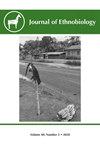当地知识和科学知识共同塑造了巴西亚马孙森林居民对上里约热内卢Negro地区疟疾的看法
IF 1.3
3区 社会学
Q1 ANTHROPOLOGY
引用次数: 0
摘要
摘要疟疾在巴西亚马逊地区流行,占全国病例的99%。亚马逊森林人民(土著和传统)根据他们的知识、仪式和宗教来理解和治疗这种疾病。近几十年来,该区域的生物医学保健覆盖面扩大,对当地预防、治疗和从疟疾中康复的观念和做法产生了影响。本文试图了解森林民族生物医学保健的扩展如何与他们的民族医学知识相互作用。我们的结果清楚地表明,我们在亚马逊西北部农村的大多数研究参与者认为,疟疾有多种原因,预防和治疗形式。我们还发现,这些信念受到当地知识(包括土著)和一些生物医学技术概念的影响。因此,需要制定新的保健方法和做法,考虑到森林人民的看法和理解。本文章由计算机程序翻译,如有差异,请以英文原文为准。
Amazonian Forest Peoples' Perceptions of Malaria on the Upper Rio Negro, Brazil, are Shaped by Both Local and Scientific Knowledge
Abstract. Malaria is endemic in Brazilian Amazonia, accounting for 99% of national cases. Amazonian forest peoples (both Indigenous and traditional) understand and treat the disease based on their knowledge, rituals, and religion. In recent decades, biomedical health coverage has expanded in the region, with implications for local perceptions and practices to prevent, treat, and recover from malaria. This paper attempts to understand how the expansion of biomedical healthcare among forest peoples interacts with their ethnomedicinal knowledge. Our results clearly indicate that most of our research participants in rural northwest Amazonia believe that malaria has a variety of causes, forms of prevention, and treatment. We also found that these beliefs are shaped by both local knowledge (including Indigenous) and some technical concepts of biomedicine. Consequently, new approaches and practices in healthcare need to be developed which consider forest peoples' perceptions and understanding.
求助全文
通过发布文献求助,成功后即可免费获取论文全文。
去求助
来源期刊

Journal of Ethnobiology
Social Sciences-Anthropology
CiteScore
4.80
自引率
3.40%
发文量
21
审稿时长
>12 weeks
期刊介绍:
JoE’s readership is as wide and diverse as ethnobiology itself, with readers spanning from both the natural and social sciences. Not surprisingly, a glance at the papers published in the Journal reveals the depth and breadth of topics, extending from studies in archaeology and the origins of agriculture, to folk classification systems, to food composition, plants, birds, mammals, fungi and everything in between.
Research areas published in JoE include but are not limited to neo- and paleo-ethnobiology, zooarchaeology, ethnobotany, ethnozoology, ethnopharmacology, ethnoecology, linguistic ethnobiology, human paleoecology, and many other related fields of study within anthropology and biology, such as taxonomy, conservation biology, ethnography, political ecology, and cognitive and cultural anthropology.
JoE does not limit itself to a single perspective, approach or discipline, but seeks to represent the full spectrum and wide diversity of the field of ethnobiology, including cognitive, symbolic, linguistic, ecological, and economic aspects of human interactions with our living world. Articles that significantly advance ethnobiological theory and/or methodology are particularly welcome, as well as studies bridging across disciplines and knowledge systems. JoE does not publish uncontextualized data such as species lists; appropriate submissions must elaborate on the ethnobiological context of findings.
 求助内容:
求助内容: 应助结果提醒方式:
应助结果提醒方式:


